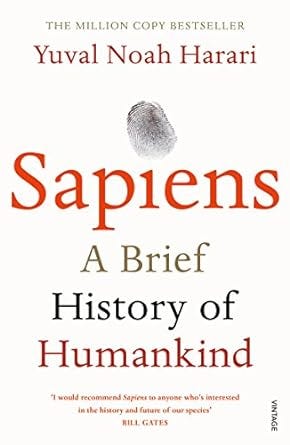What makes us brilliant? What makes us deadly? What makes us Sapiens?
Yuval Noah Harari challenges everything we know about being human.
Earth is 4.5 billion years old. In just a fraction of that time, one species among countless others has conquered it: us.
Here are seven #bigideas from Sapiens: A Brief History of Humankind by Yuval Noah Harari:
The Cognitive Revolution: Around 70,000 years ago, humans developed the capacity for complex language and shared myths, enabling large-scale cooperation. This revolution set Homo sapiens apart from other species and was the foundation for societal and cultural development.
The Agricultural Revolution: About 10,000 years ago, humans transitioned from foraging to farming, fundamentally altering human societies. While it allowed population growth and the development of civilizations, it also introduced social hierarchies, inequality, and a heavier workload.
The Unifying Power of Shared Myths: Shared beliefs—religions, nations, ideologies—enable large groups of people to cooperate. Harari argues that these imagined realities, though intangible, are vital for organizing complex societies.
Money as a Universal Connector: Money is one of humanity’s most effective shared myths, allowing cooperation and trade among people who don’t know each other personally. It transcends cultural and geographical boundaries, acting as a universal trust mechanism.
The Role of Empires: Empires have played a significant role in uniting diverse groups of people and spreading knowledge, culture, and technology. Harari critiques their violence but also recognizes their contributions to global unity and progress.
Science and the Modern Era: The Scientific Revolution, beginning in the 16th century, marked a shift to understanding the world through observation and experimentation. It fueled technological advancements, economic growth, and the rise of global empires.
The Anthropocene and Human Responsibility: Humans have become a dominant force on Earth, capable of shaping ecosystems and even altering the planet’s climate. Harari highlights the ethical questions this raises about our impact on other species and the planet’s future.











